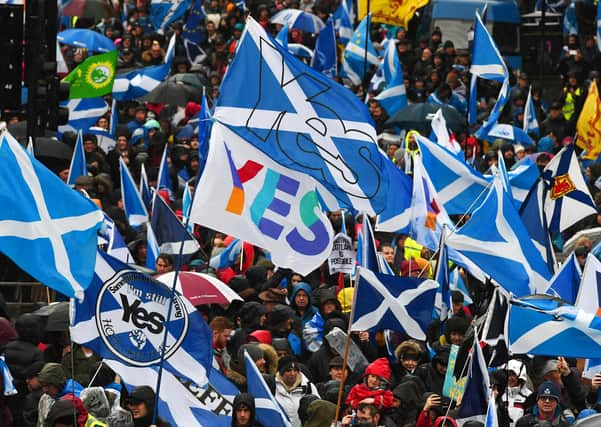Coronavirus: How Covid-19 could torpedo independence – Alastair Stewart


This piece was originally very different. I was going to argue that prefixing institutions and groups with “Scottish” was undercutting national confidence yet fuelling nationalism and the appetite for independence.
And yet, a mere seven days later and I’ve gutted this idea. Not only has the Scottish Government paused any pursuit of indyref2 this year, but the devolved and UK governments are working balletically to try to tackle COVID-19.
Advertisement
Hide AdAdvertisement
Hide AdCoronavirus hasn’t just stopped any reasonable chance of Scottish independence; it’s made its very discussion utterly irrelevant. Downing Street has all but nationalised work with an 80 per cent subsidy of workers’ wages to get through the crisis. It’s impossible to compare austerity or the financial bailouts with the social and economic transformation to come.
The last time the UK experienced an epochal shift of this magnitude was mobilisation in the Second World War and the launch of the welfare state. Thatcherism might have rolled back the post-war consensus, but that was some slight remodelling compared to what the post-COVID-19 world will look like.
The country has never seen societal and economical intervention on this scale. So staggering is the shift we might overlook that will it ever be possible to explain away homelessness or child poverty again? Never again can governments claim it can’t be done in the UK.
Nothing unites like a calamity
We might also forget that this will, eventually, come to an end. Old political arguments will raise their head once more. It’s easy to imagine the UK government granting indyref2 on the sure footing that the Scots would never risk the tumult.
Nothing unites a people like a calamity. Nothing tests political systems like a disaster. And yet, by every reasonable measure, the constitutional mechanisms are holding. Devolved areas like health management and education are not labouring under any politicking. The UK government has not – at the time of writing – forced any policy on the Scottish Government.
Of course, the biggest tests have yet to come. Any severe divergence of health policy between the UK and Scottish administrations will fracture this temporary harmonisation wide open. At the moment, politicians of wildly different colours have achieved some semblance of popularity by calmly issuing blank cheques.
When the purse strings begin to fray or victory’s in sight, the tough questions will be unavoidable. What could the Government have done to better ready frontline services; who slashed NHS funding and who didn’t anticipate COVID-19 would be a problem?
The Prime Minister is fond of World War II analogies, so here’s one he might be forgetting. Hindsight is seldom kind and, like the brutal verdict on the war readiness of Stanley Baldwin, Neville Chamberlain and even Winston Churchill, will be rendered on our own medical appeasers and budget cutters that left us vulnerable.
Advertisement
Hide AdAdvertisement
Hide AdEven these political torpedos will be unlikely to sink the UK in the post-corona world. If it’s a tough but robust victory, Scottish nationalism will likely go into retreat under a desperate need for normality. Presuming that the 2021 Scottish election is delayed until the virus is subdued, a sensible campaign will centre on post-match analysis policy reform and not “the vision thing”.
In the 2014 referendum, independence was framed as a “hope versus fear” argument by Yes supporters. They weren’t wrong. One Brexit and an epidemic later, this sounds less like a slur and more an honest appraisal of what challenges face Scotland.
It’s usually the ones with least to lose who want a cerebral constitutional change. If Brexit was an alarm bell, COVID-19 is a klaxon. Constitutional conservatism and unionism are very likely to return with force as people clamour to get back to business as usual. Of course, strive, and state disintegration, go hand in hand. In the run-up to the break-up of major states, there’s often a phase where the central authority offers a compromise. Before partition, the British tried to introduce a fully federal system to India to dissipate ethnic tensions and political imbalance. The Croats and Slovenes sought to reform Yugoslavia by delegating even more power to six republics, but they were continuously voted down. And then, of course, there’s Mikhail Gorbachev before the collapse of the USSR.
The ‘us and them’ mentality
The UK system has always worked as a fudge. Never quite autocratic and never as centralist as some have made out since the Acts of Union. Throughout history, there has been the need of some groups to form an identity with an enemy – the “us and them” mentality. Britain has proven itself remarkably resilient to pressures to split and the home nations repeatedly come together when someone – or something – threatens our way of life.
The UK and Scottish governments working in tandem is a hierarchical accomplishment, but it won’t completely negate profound tensions about the imbalance of Scotland’s voice in the union. The scale of COVID-19 has ably demonstrated that economic power is everything. The awesome power of what is (technically) a unitary British state will be hailed the hero for defeating the virus. One wonders how the country would have voted if Brexit was a year from now. Certainly, one day, the question will be asked if an independent Scotland could have tackled this crisis.
Robert Kennedy famously said: “There is a Chinese curse which says ‘May he live in interesting times.’” This isn’t Trumpian innuendo, merely a pause to reflect and say how we all long for the simpler days of Brexit and mandate mayhem over who has the right to demand or deny a referendum.
Let’s all look forward to taking the gloves off, quite literally, and getting back to business as usual.
Alastair Stewart is a freelance writer and public affairs consultant. Read more at www.agjstewart.com and on Twitter @agjstewart
Comments
Want to join the conversation? Please or to comment on this article.